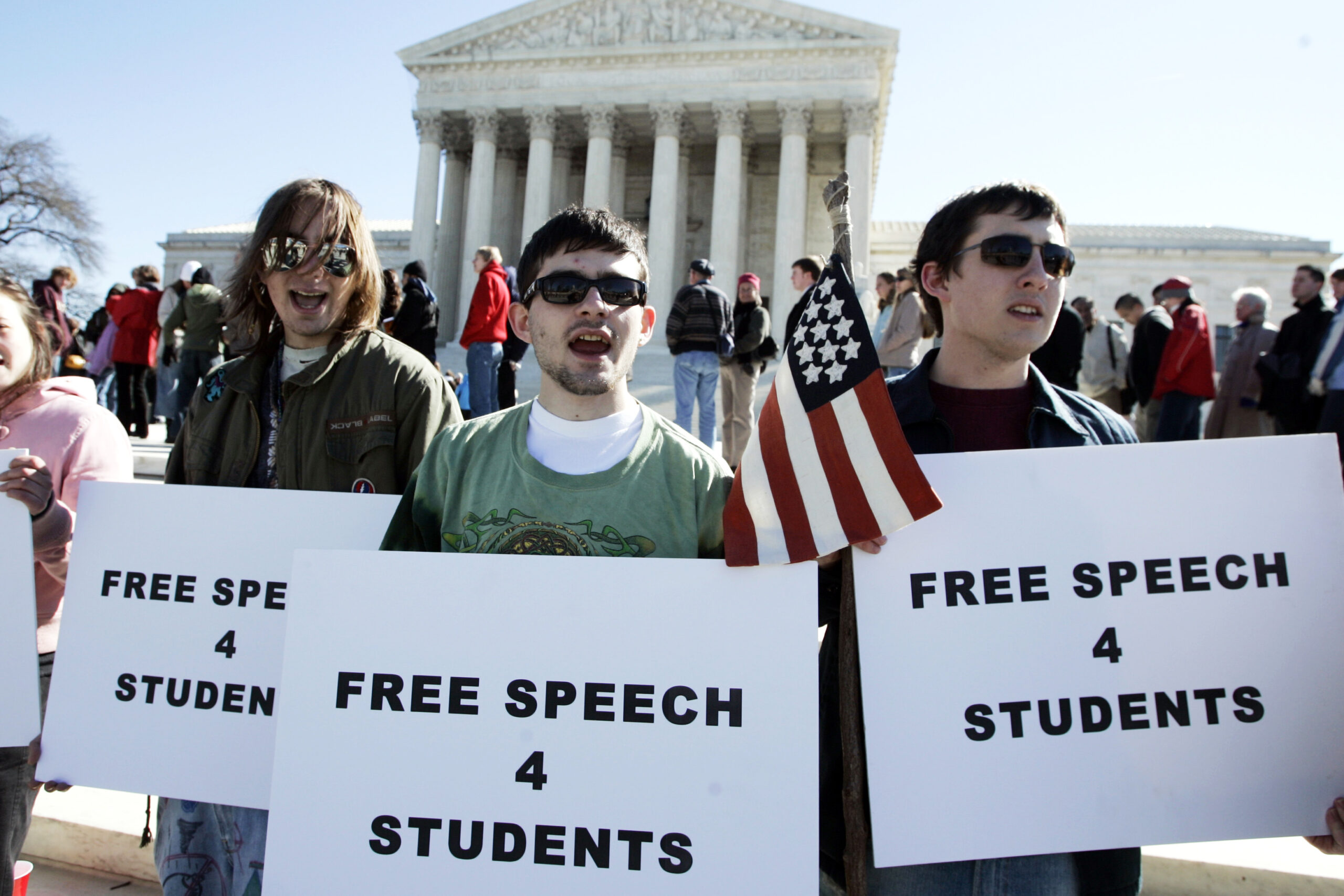
Study From the Foundation for Individual Rights in Education Reveals U-M Policies Used to Police Student Speech Are Unconstitutional
In a recently released report, the University of Michigan earned a failing grade (a yellow light) for its campus policies that seek to regulate student speech. Officials from the Foundation for Individual Rights in Education (FIRE) explain:
A yellow light institution maintains policies that could be interpreted to suppress protected speech or policies that, while clearly restricting freedom of speech, restrict relatively narrow categories of speech. For example, a policy banning “verbal abuse” has broad applicability and poses a substantial threat to free speech, but is not a clear violation because “abuse” might refer to unprotected speech and conduct, such as threats of violence or unlawful harassment. Similarly, while a policy banning “profanity on residence hall door whiteboards” clearly restricts speech, it is relatively limited in scope. Yellow light policies are typically unconstitutional when maintained by public universities, and a rating of yellow light rather than red light in no way means that FIRE condones a university’s restrictions on speech. Rather, it means that in FIRE’s judgment, those restrictions do not clearly and substantially restrict speech in the manner necessary to warrant a red light rating.
State of the Speech Codes: Michigan
In early 2018, then-Michigan State University President Lou Anna K. Simon declared that her university is “wholly
dedicated to freedom of speech, not just as a public institution, but as an institution of higher education. Here, ideas–not people–are meant to clash and to be evaluated based on their merits. As I noted in a long-standing statement on freedom of speech, ‘Without this freedom, effective sifting and testing of ideas cease, and research, teaching, and learning are stifled.’”
According to the FIRE report, Simon’s “laudable commitment to free expression on campus is consistent with what most college students should expect, and with good reason. Public institutions are legally bound by the First Amendment, and the vast majority of private colleges and universities promise their students commensurate free speech rights.”
However, according to the policies examined by FIRE, many institutions fail to live up to these free speech obligations, in policy and in practice—including the University of Michigan and Michigan State. In its report, the Foundation for Individual Rights in Education (FIRE) examined the speech codes–policies that regulate student expression that would be protected by the First Amendment in society at large–on Michigan’s campuses, including all public four-year institutions. For its report, FIRE surveyed publicly available policies at 17 four- and two-year public institutions and nine private institutions in Michigan. FIRE performed new research on policies at 11 institutions, and reviewed and updated the ratings of 15 institutions already included in the organization’s Spotlight database of school policies.
The FIRE report found that, on average, Michigan schools earn worse ratings than the national average. While 18.5% of schools in the FIRE database earned a red light, 26.9% of the Michigan schools we reviewed earn a red light rating for maintaining at least one policy that clearly and substantially restricts free speech. Further, FIRE’s report reveals that, “19.2% of reviewed Michigan institutions (and a staggering 55.6% of private schools) earn a Warning rating for making clear in written policy that the school will not protect students’ free speech rights. In the Spotlight database, just 1.5% of institutions nationwide earn a Warning rating.”
University of Michigan Bias Response Policy Lawsuit
In 2019, Speech First, an organization committed to defending free speech on college campuses, sued the
University of Michigan over its Bias Response Team and the policy governing that team, which could refer cases to
governmental entities that could impose punishment and could also invite students to meet with them. FIRE supported Speech First’s suit by filing an amicus brief, urging the court to reach the merits of the case and secure Michigan students’ rights.
The United States Court of Appeals for the Sixth Circuit found that the Bias Response Team was likely to chill students’ speech. The Sixth Circuit explained that because the Bias Response Team had the ability to refer cases to governmental entities that could impose punishment and could invite students to meet with them, there was an “implicit threat of consequence” if the student declined the invitation. Following the ruling, the University of Michigan settled the case, agreeing to revise all policies challenged in the litigation and instead adopting a “Campus Climate Support” policy to provide support for those who feel they may have been harmed by some event. This policy now earns a green light rating because it makes clear that students will not be investigated or punished for their protected speech. This policy can serve as a model for institutions who wish to avoid spending years and hundreds of thousands of dollars litigating a restrictive speech code.
The above example demonstrates the concerns associated with enforcement of speech codes in the state of Michigan. Even so, their threat is not limited to application. As the Sixth Circuit recognized, even prior to enforcement, restrictive policies threaten to cast a chilling effect over the expression of students who read them and fear expressing themselves will land them in trouble. Policy revision, therefore, helps improve the overall climate for free expression on campus for all, not just those targeted when a policy is enforced.
While the review of Michigan schools’ policies turned up issues in every category of speech codes monitored in FIRE’s Spotlight database, some policy categories popped up most frequently: namely, policies related to harassment, internet usage and social media (“IT policies”), and restrictions on posting flyers and other materials on campus (“posting policies”). This finding is consistent with data on which policies tend to earn poor ratings nationwide.

Comments are closed, but trackbacks and pingbacks are open.